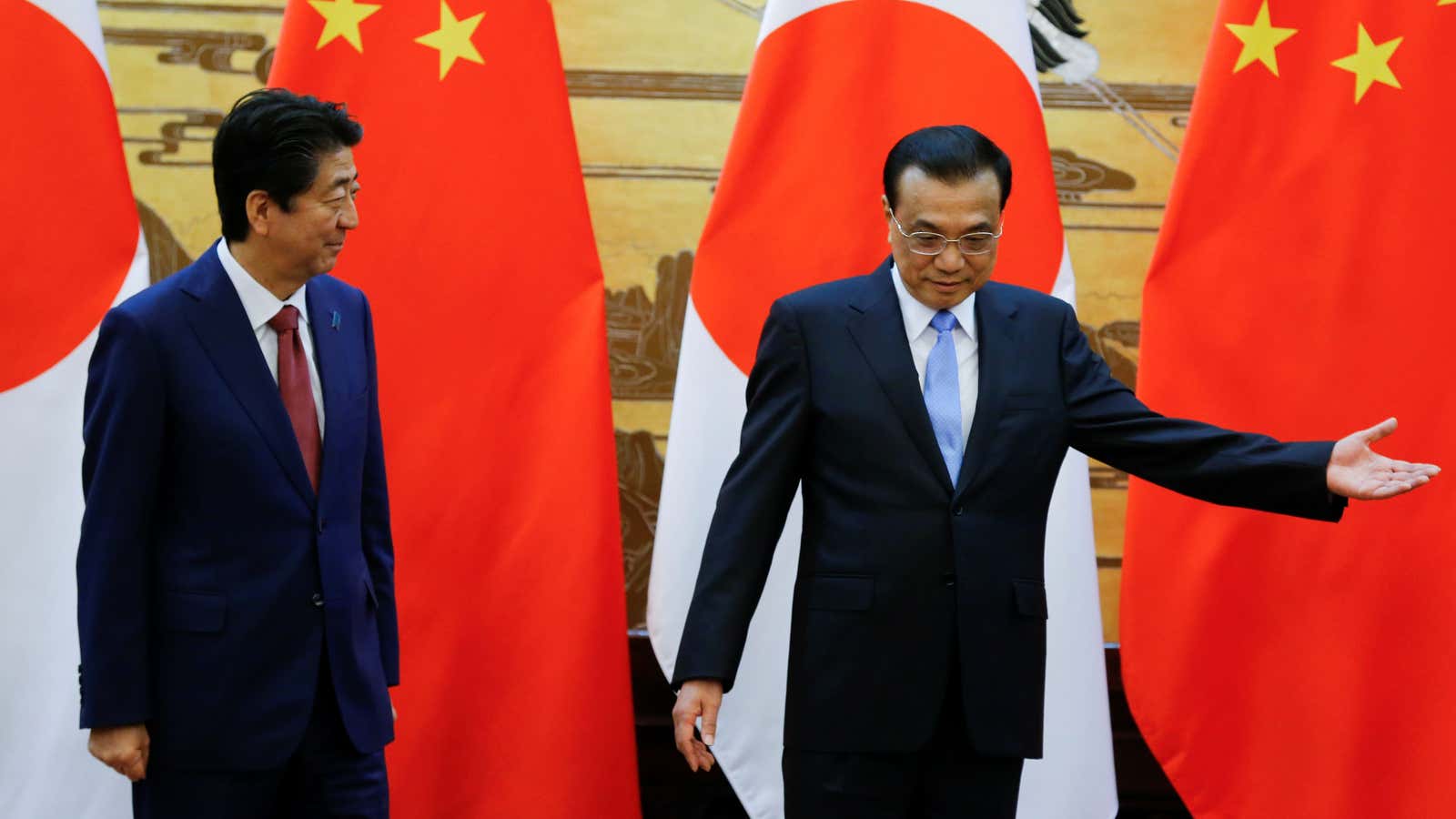This week, 150 years ago, Japan marked a historic turning point with the establishment of the Meiji era, which began its transformation into a powerful, imperialist nation that would see it conquer China and vast swathes of Asia.
It was also this week, four decades ago, that a friendship treaty to normalize relations between the two countries went into effect, three decades after the end of World War II and Japan’s occupation of China, and on the eve of the reforms that would dramatically change China’s economy.
Now Shinzo Abe, on the first official visit by a Japanese leader to China in seven years, is proclaiming another “historic turning point” in Sino-Japanese relations.
Hostile rhetoric from US president Donald Trump against both countries over trade has certainly helped to push (paywall) the two big trading partners together—premier Li Keqiang said today (Oct. 26) in a press conference following a meeting with Abe that Japan and China have to “actively safeguard free trade.” Tensions on the Korean peninsula, too, have necessitated that the two biggest powers in the region cooperate more closely.
But it’s perhaps facing up to the changed economic realities more than anything else that has forced Japan—seven years after it was overtaken by China as the world’s second-largest economy—to signal a new approach toward China, as evidenced by the entourage of 1,000 businesspeople who accompanied Abe.
China this year replaced the US to become Japan’s biggest export market for the first time since 2011, and looks set to remain that way (paywall). China is also now the biggest source of foreign visitors to Japan, at a time when tourism is one of the biggest drivers of the Japanese economy. That’s even helped drive an improvement in Chinese people’s feelings toward Japan, according to a recent survey conducted by a Japanese organization—although the sentiment was not reciprocated on the Japanese side, with almost 90% of Japanese surveyed saying they have an unfavorable view of China.
Japan also earlier this week ended its aid program to China after 40 years, with China having at one point been the biggest recipient of Japanese donations.
China and Japan agreed (paywall) during Abe’s visit to cooperate on a number of infrastructure projects in Asia, which Beijing will seek to paint as an advancement for its flagship Belt and Road infrastructure program, although Japan—which competes against China particularly in Southeast Asia in infrastructure development—has repeatedly stressed the need for transparency in such projects. For China, engaging Japan and learning from its experience in development could be a way to mitigate mounting criticism of the Belt and Road project, while cooperating with China means greater business opportunities for Japanese companies, Japan’s Mainichi newspaper posited.
Still, any proclamation of a turning point in Sino-Japanese relations is one that should be approached with conservatism, even skepticism, given the long history of hostility between the two. Victor Teo, an expert on Japan at the University of Hong Kong, said that that under the fervently nationalistic Abe, “Japan is not acquiescing to being No. 2 to China.”
This is perhaps most evident in questions of defense and sovereignty, particularly over the issue of the Senkaku or Diaoyu islands, which are administered by Japan but claimed by China. On that front, Abe said today that the two sides will work toward defusing tensions by establishing a hotline between defense officials improving cooperation over maritime accidents.
It’s also worth noting that during his visit to China, Abe extended a rare invitation to Indian prime minister Narendra Modi to stay at his holiday home later this month, as the two countries deepen their already close ties in the face of China’s ascendancy.
For Abe—newly emboldened by a recent party election that granted him three more years in power—domestic goals also remain the first priority, said Teo. Chief among these are the amendment of the post-war constitution to expand the powers of its Self-Defense Force—an issue that will no doubt anger China.
